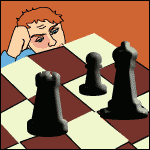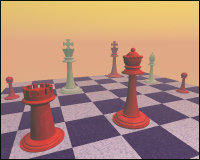Uncrowned chess kings
Created | Updated Dec 8, 2006
Since 1886, when Wilhelm Steinitz became the first official holder of the title, there have been only fourteen chess champions of the world. However, there are a few great masters who only narrowly missed becoming World Champion.

- Louis Paulsen, the German theoretician, drew a match with unofficial champion Adolf Anderssen in 1862, +3-3=2, which in retrospect counts as a close call. He also beat him twice in later matches, although by then Anderssen had yielded to Wilhelm Steinitz as champion, albeit still unofficially.
- Johannes Zukertort, the Polish polymath, was arguably past his peak in 1886 when he played Steinitz and lost -10+5=5. Had they played in the early 1880's, when he was in his prime, the outcome might have been reversed.
- Mikhail Tchigorin, the legendary Russian master, came close to dethroning Steinitz in 1892, losing -10+8=5 after losing the final game from a completely won position. He made a beginner's blunder, overlooking a checkmate in two moves for his opponent.
- Siegbert Tarrasch, the doctor from Nuremberg, could well have won the title had he not spurned a challenge from Steinitz in 1893. His rival Emanuel Lasker took the title instead in 1894, and held it for 27 years.
- Harry Nelson Pillsbury from America would probably have posed a real threat to Lasker's title at the turn of the century, had it not been for poor health and an early grave. He won the great tournament at Hastings, 1895, ahead of Lasker, and had a career 'evens' score with him (+4-4=4).
- Karl Schlechter from Vienna almost became world champion in 1910, drawing a short match with Lasker, +1-1=8. Lasker saved his title by winning the final game of the match from a highly dubious position.
- Alexei Shirov from Latvia beat Kramnik in 1998 in a short match, +2=7. This match was arranged to decide who was to challenge Kasparov, then the world champion. In the event it was Kramnik who went on to play Kasparov - and won.
- Peter Leko from Hungary came close to winning the title in 2004, drawing a match with Kramnik, +2-2=10. Kramnik levelled the match by winning a tense final game. This was the nearest miss by a challenger for over fifty years.

There are four players in particular who are regarded as having been of championship calibre, and might be categorised as 'uncrowned kings'. Akiba Rubinstein at the end of the first decade of the last century, and Paul Keres from the late 1930s to the late 1940s, were regarded as heirs apparent to the title. But Rubinstein never played Emanuel Lasker, and Keres never played Alexander Alekhine, partly because war intervened; these are the great championship matches that never were. More recently, David Bronstein drew a title match with Mikhail Botvinnik in 1951, in the nearest miss of the post war era, +5-5=14, after losing the penultimate game. And Viktor Korchnoi lost only narrowly to Anatoly Karpov in 1978, +5-6=21, after losing the last game of the match.
Some details of these four great players are given below.
Akiba Rubinstein
b.1882 (Stawisk), d. 1961 (Antwerp). Akiba Rubinstein became well known in the decade before the Great War. His record from 1907 up to 1913 was unsurpassed; he won several very strong tournaments, including Karlsbad, 1907, and St Petersburg, 1909, equal with Emanuel Lasker. At San Sebastian, 1911, he came second to Jose Raoul Capablanca by half a point, beating him in their individual game, and in 1912, the so-called 'year of Rubinstein', he won at San Sebastian, Pistyan, Breslau, Warsaw and Vilnius. Winning no fewer than five important international tournaments in one year is a feat that remains unique. He challenged Lasker to a title match, but was unable to raise the necessary finance before the Great War broke out. After 1918 he was not quite the same player, although he did win at Vienna, 1922, ahead of Alexander Alekhine. The rise of Capablanca eventually ended his chances of taking the world title. Rubinstein won every match he played apart from one in his youth (1903), which he drew, and is considered by many to be perhaps the strongest player who never played a world championship match. His style was crystal clear and highly artistic, and he left behind more 'ideal' games than any other master. The game Rubinstein-Lasker, St Petersburg, 1909, shows how the artist dealt with the pugilist the first time they met over the chess board. White's subtle eighteenth move and its continuation had to be foreseen well in advance.
Paul Keres
b.1916 (Narva), d.1975 (Helsinki)
Paul Keres scored several early successes, becoming champion of Estonia in 1934, 1935 and 1936, and winning in 1937 at both Margate and Semmering-Baden. After his first place at the very strong AVRO tournament at Rotterdam, 1938, ahead of Mikhail Botvinnik, Alekhine, Max Euwe and Capablanca, he was widely regarded as the heir apparent to the world title. However, just as he reached his peak strength, World War II broke out. He was favourite to win the World Championship tournament at The Hague, 1948, but unexpectedly crumbled to the better prepared Botvinnik. From then until the mid 1960s he remained one of the strongest challengers for the title, but (like Rubinstein half a century earlier) never played a championship match. Keres remained in the top ten for thirty years. He was a candidate seven times, coming second four times from 1953 to 1962 (twice to Vasily Smyslov, and once each to Mikhail Tal and Tigran Petrosian). In the candidates' cycle of 1965 he was eliminated by the eventual winner and challenger for the title, Boris Spassky. He was three times champion of the USSR. Keres's style was open and attacking. In the game Euwe-Keres, Amsterdam, 1940, he shows little respect for a former world champion.
David Bronstein
b.1919 (Kiev), d.2006 (Minsk). David Bronstein won the USSR championship twice, in 1948 and 1949 (equal with Smyslov). In 1950 he won the candidates' tournament at Budapest. The following year he played Botvinnik for the world title, but could only draw, +5-5=14, after losing the penultimate game. Thus Botvinnik kept the title. Bronstein came second at the next candidates' tournament, Zurich, 1953 (with Keres, after Smyslov), and wrote the celebrated book of the tournament. He won the Moscow championship six times. David Bronstein is a second cousin of Leon Trotsky, and his father was imprisoned in a gulag for eight years; this circumstance does not seem to have held him back, although the Soviet establishment doubtless favoured Botvinnik over him when they played for the title. A charismatic personality and engaging writer, his style at the chessboard was notably imaginative and artistic, as exemplified in the game, Bronstein-Keres, Goteborg, 1955.
Viktor Korchnoi
b.1931 (Leningrad). Viktor Korchnoi won the USSR championship four times between 1960 and 1970. In the 1968 candidates' matches he was eliminated by the eventual champion, Spassky. In the 1971 cycle he defeated Tal, but lost to Petrosian (who was eliminated in turn by the eventual champion, Bobby Fischer). In 1974 he defeated Petrosian, but lost in the finals to Karpov; in retrospect that match decided the world championship, since Fischer declined to defend his title against the winner. After defeating both Petrosian and Spassky to win the 1977 cycle, he lost the 1978 championship match to Karpov by the narrowest margin. In 1980 he won the candidates' cycle again, defeating Petrosian (again), but he lost to Karpov once more in the 1981 title match. In the 1983 cycle he was eliminated by the eventual champion, Gary Kasparov. In 1976 he had 'defected' from the USSR, and in his later matches he was a dissident, pitted alone against great players supported by the powerful Russian Chess Federation, a context that should not be overlooked. He is currently the oldest active grandmaster on the world circuit. A player of fighting, counter-attacking chess, he is in his element in sharp, unbalanced positions. Perhaps for this reason he was always the most difficult opponent for the great Mikhail Tal, who often steered for such situations himself. The game Korchnoi-Tal, Yerevan, 1962, is a particularly hard-fought battle between the two.
